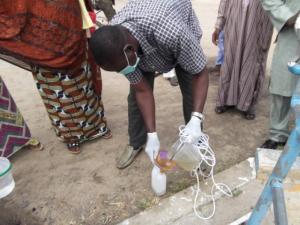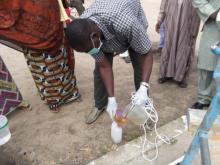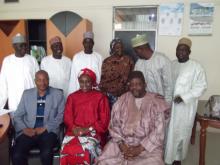Nigeria surmounting odds to intensify poliovirus surveillance amidst insecurity in Borno State
Borno State of Nigeria has been facing security challenges because of stiff insurgency, resulting into loss of lives and property, crippling economic, social as well as commercial activities. The health sector is not spared and it is on record that some health workers made the ultimate sacrifice during one of the insurgents’ attacks. The negative fallout necessitated the postponement of the March 2013 Polio Immunization plus Days (IPDs) round by the State government.
The gold standard for polio surveillance in the Global Polio Eradication Initiative (GPEI) Programme is the detection of cases of Acute Flaccid Paralysis (AFP) and laboratory testing of stool specimens from these patients in a WHO accredited laboratory. Environmental surveillance, on the other hand, is complimentary to AFP surveillance as it can also detect circulation of wild and/or vaccine-derived polioviruses in the population.
The latest polioviruses type 3 (WPV3)cases in Nigeria were reported in the second half of 2012 in the security compromised North Eastern axis of Borno and Yobe states. No WPV3 cases were detected since January 2013; therefore it was important to be certain that although the cases were not being detected in humans through acute flaccid paralysis (AFP) surveillance in Borno and Yobe State, there was no missed circulation of WPV3 in the sewage system that would re-infect humans. Pursuant to the above and despite the insecurity peculiarities of the state, the Borno State Ministries of Health and of Environment, with the support of WHO in collaboration with the National Primary Health Care Development Agency (NPHCDA), established environmental surveillance with the immediate deployment of staff for site selection, training and transportation of samples from Maiduguri to Ibadan Polio Laboratory for sample analysis.
Already, four environmental sampling sites are now functional within the State in two (2) of the Very High Risk (VHR) Local Government Areas (LGAs) in the heart of the Borno; areas once thought to be inaccessible and unsecured.
Coupled with insecurity concerns, environmental surveillance in Borno was undoubtedly established amidst other challenges which included stoppage of communication signals due to the State of Emergency; delayed transportation of stool samples following cancellation of commercial flights and multiple blockages of drain pathways with sand and debris restricted free flow of sewage.
The addition of Borno increases to five (Kano, Sokoto, Kaduna, Lagos and Borno) and the Federal Capital Territory (FCT), the number of states currently conducting environmental surveillance. In 2013, 4 (80%) out of the 5 circulating vaccine derived polioviruses (cVDPVs) detected among AFP cases in Nigeria were from Borno State; and the established environmental surveillance in Borno isolated 8 cVDPVs (44%) out of a total of 18 cVDPV isolates in the country. All cVDPV isolates were polio serotype 2. A total of 53 WPV cases were laboratory confirmed from the national AFP surveillance network and 3 from the environment (Kano with 1 case and Sokoto State with 2 cases). All were polio serotype 1.
In conclusion, no WPV3 has been detected in AFP surveillance network and in environmental surveillance sites in the country in 2013, including in the established sites of Borno State, the geographical axis that had latest circulation in November 2012, showing signs of stopped circulation of polio serotype 3 in the most vulnerable and endemic States of Nigeria.






